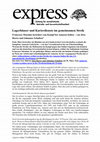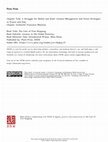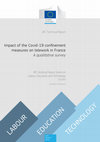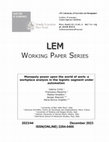Talks by Francesco S . Massimo
Der Freitag - Die Wochenzeitung, 2021
Interview 40.000 Amazon-Beschäftigte legten in Italien die Arbeit nieder. Was deutsche Gewerkscha... more Interview 40.000 Amazon-Beschäftigte legten in Italien die Arbeit nieder. Was deutsche Gewerkschaften daraus lernen können, erklärt der Soziologe Francesco Massimo In Italien wird Amazon bestreikt, unter anderem in Brandizzo in der Nähe von Turin Foto: Marco Bertorello/AFP/Getty Images In der vergangenen Woche legten 40.000 Amazon-Beschäftigte in Italien die Arbeit nieder. Welche Gründe dieser Erfolg hat und was die deutschen Gewerkschaften daraus lernen können, erklärt der italienische Soziologe Francesco Massimo. Francesco Massimo ist gebürtiger Römer und forscht am Institut d'études politiques de Paris zu Arbeit und Arbeitskämpfen bei Amazon.

Zeitung für sozialistische Betriebs- und Gewerkschaftsarbeit, 2021
Francesco Massimo berichtet vom Kampf bei Amazon Italien – von Jörn Boewe und Johannes Schulten
... more Francesco Massimo berichtet vom Kampf bei Amazon Italien – von Jörn Boewe und Johannes Schulten
Ende März bestreikte ein Bündnis aus drei landesweiten Gewerkschaften erstmals die komplette Amazon-Lieferkette — von den Versandzentren bis zur Paketzustellung. Warum die Streiks ein Meilenstein im Kampf gegen den Online-Giganten sein könnten und was die deutschen Gewerkschaften lernen können, erklärt der italienische Soziologe Francesco Massimo. Er ist gebürtiger Römer und forscht am Institut d’études politiques de Paris zur Arbeit und Arbeitskämpfen bei Amazon. In der vergangenen Woche hat er einen vielbeachteten Artikel zu den Streiks bei Amazon Italien für das US-amerikanische Jacobinmag geschrieben.
Das Interview führten Jörn Boewe und Johannes Schulten am 28. März. Eine gekürzte Version erschien zuvor in der Wochenzeitung der Freitag.
Weiter im pdf-Dokument.
Books by Francesco S . Massimo

The Cost of Free Shipping: Amazon in the Global Economy, 2020
Chapter 8 in Jake Alimahomed-Wilson and Ellen Reese (eds.), The Cost of Free Shipping. Amazon in ... more Chapter 8 in Jake Alimahomed-Wilson and Ellen Reese (eds.), The Cost of Free Shipping. Amazon in the Global Economy. London: Pluto Press, 2020, pp. 129.-145
Amazon is the most powerful corporation on the planet and its CEO, Jeff Bezos, has become the richest person in history, and one of the few people to profit from a global pandemic. Its dominance has reshaped the global economy itself: we live in the age of 'Amazon Capitalism'.
'One-click' instant consumerism and its immense variety of products has made Amazon a worldwide household name, with over 60% of US households subscribing to Amazon Prime. In turn, these subscribers are surveilled by the corporation. Amazon is also one of the world's largest logistics companies, resulting in weakened unions and lowered labor standards. The company has also become the largest provider of cloud-computing services and home surveillance systems, not to mention the ubiquitous Alexa.
With cutting-edge analyses, this book looks at the many dark facets of the corporation, including automation, surveillance, tech work, workers' struggles, algorithmic challenges, the disruption of local democracy and much more. The Cost of Free Shipping shows how Amazon represents a fundamental shift in global capitalism that we should name, interrogate and be primed to resist.
Lavoro alla spina, welfare à la carte. Lavoro e Stato sociale ai tempi della gig economy, 2019
A quantitative and qualitative analysis of the in the logistics sector's labor market in Italy
Papers by Francesco S . Massimo

Journal of Labor and Society, 2018
Ten years after the financial crash, in the middle of regional wars and geopolitical shifts, the ... more Ten years after the financial crash, in the middle of regional wars and geopolitical shifts, the global economy seems an unstoppable machine. Every day, information, commodities, and financial fluxes flow with almost no interruption-except those provoked by bankers and world leaders. The global economy is in motion but in a direction that seems beyond people's control. However, this book shows that this machine is not unstoppable. First, the global economy relies on a complex physical infrastructure, an "internet of things," as it has been happily defined, that is, the global supply chain. Second, the global supply chain is a vulnerable infrastructure and logistics workers can disrupt its regular functioning, and take advantage of this "strategic position" by literally grounding capitalist circulation to a halt. The editors are two remarkable scholars who, in recent years, have not only contributed to a deeper understanding of American and international labor, but have also paid special attention to political activism through the American labor movement and academia. Consistently, the book is intended to preserve a plurality of voices: chapter 6 is written by Amazon workers and chapters 12, 13, and 15 by labor organizers, whereas the remaining chapters come from a political commitment to academic research on labor in the global supply chain. Perhaps such an heterogeneity of gazes (15 contributions by 27 authors from all over the world) is difficult to manage and it partly affects the organization of the book; yet, here lies the power of the book, that is, the ability to show the concrete and diverse facets of the global supply chain, without neglecting historical depth (see in particular chapters 3 and 15). However, besides this general statement, the book has to be assessed in its ability to answer three main questions:

European Commission, Joint Research Centre (JRC), 2022
A full understanding of the technological complexity underlying robotics and automation is still ... more A full understanding of the technological complexity underlying robotics and automation is still lacking, most of all when focusing on the impacts on work in services. By means of a qualitative analysis relying on the administration of more than 50 interviews to HR managers, IT technicians, workers and trade union delegates, this work provides evidence on the main changes occurring at shopfloor level in selected Italian companies having adopted technological artefacts potentially affecting labour tasks by automating processes. The analysis of interviews complemented with visits to the companies and desk research on business documents highlights that so far labour displacement due to the adoption of automation technologies is not yet in place, while tasks and organizational reconfiguration appear more widespread. Major heterogeneity applies across plants due to the final product/service produced, the techno-organizational capabilities of the firm and the type of strategic orientation versus technological adoption. These elements also affect drivers and barriers to technological adoption. Overall, the analysis confirms the complexity in automating presumably low-value-added phases: human labour remains crucial in conducting activities that require flexibility, adaptability and reconfiguration of physical tasks. Further, human agency and worker representation, in particular the role of trade unions, are almost disregarded and not considered by the firms when deciding to introduce a new technology.

Etnografia e ricerca qualitativa, 2020
The development of platform capitalism and the digitization of labor processes have enabled schol... more The development of platform capitalism and the digitization of labor processes have enabled scholars and the public to describe the contemporary organization of work giving particular emphasis to the role of algorithms. Through document analysis, interviews, participant observation and a direct work experience in two Amazon distribution centers, the article argues against the myth of the algorithmic organization of work. In order to do so, it proposes questioning the centrality of algorithms in management, locating them within a broader system of rules and practices. Rather than relying on concepts such as algocracy (Aneesh, 2006, 2009), the article tries to retrive and revisit the ideal type of bureaucracy in a «Pluralist» meaning (Gouldner, 1954; Burawoy, 1979; Edwards, 1979), putting it to the test of empirical analysis of the labor process.
Keywords: labor process, algorithmic management, platform capitalism, bureaucracy

Quaderni di rassegna sindacale, 2019
Drawing from the ethnographic and participant observation in the most important Amazon logistics ... more Drawing from the ethnographic and participant observation in the most important Amazon logistics hub in Italy, this paper propose to understand platform capitalism through the perspective of Taylorism and scientific management. In the first section of the paper the internal functioning of the distribution center is described, particularly with respect to the organization of work, the management of the workforce and the social relations between workers and management. In the second section a diachronic approach
is adopted and two patterns of organization and workers-management relations are defined: first, a «neo-familistic» and consensual pattern in which management successfully involves the workforce in the labor process; second, a «bureaucratic-disciplinary» pattern in which increasing Taylorization, together with other factors, threatens the inclusion and consent of the workforce. From this account Taylorism, as defined by many authors (i.e. Braverman, Burawoy, Edwards), proves to be a relevant perspective for the understanding of work in platform capitalism, under the condition of taking seriously its constraints and possible adjustments.

Critique internationale. Revue comparative de sciences sociales, 2020
In the long history of the workers’ cooperative movement in Italy, logistics became one of the mo... more In the long history of the workers’ cooperative movement in Italy, logistics became one of the most important sectors during the two last decades. Yet, during the 1990s, cooperatives embarked in a generalized process of “entrepreneurization”. In reason of their cooptation in transnational value chains, cooperatives became the pivot of a regime of despotic labor that denied workers industrial citizenship and basic social and civil rights. Since the 2010s, this system has been challenged by a series of mobilizations led by “autonomous” or “grassroots” labor unions (SI Cobas and ADL Cobas) demanding the a abolition of cooperatives, the end of the sub-contracting system, and the restoration of standard employment relationships. Workers’ struggles have allowed working conditions to be improved in the warehouses. Nevertheless, the Cobas also have had to face the institutional constraints specific to this sector: namely, the cooperatives’ reluctancy to normalize their employment relations, client companies’ resistance to reduce pressure on labor cost, and the ambivalence of traditional labor unions vis-à-vis rank-and-file mobilizations. The result of the interaction between mobilizations and institutional constraints is a precarious compromise, in which the improvement of working conditions and the recognition of grassroots unions cannot be taken for granted in face of constant employer’s backlash.

European Commission - JRC Working Papers Series on Labour, Education and Technology, 2020
During the Covid crisis the population in regime of telework jumped from 3% to 25% of the workfor... more During the Covid crisis the population in regime of telework jumped from 3% to 25% of the workforce. This study aims at better understanding how the massive shift to telework following the outbreak of the COVID-19 pandemic affected workers’ jobs and lives in France during the first lockdown (March 17th-May 11th 2020). In particular, we shed light on how this exogenous change had an impact on tasks content and work organisation dimensions like teamwork, routine, workers’ autonomy and types and extent of supervisory controls method. Moreover, we dig into both subjective and objective dimensions of job quality such as job satisfaction, motivation, changes in working time and pay, together with issues related to physical and mental health and more generally to work-life balance. The picture that emerges is quite fragmented, largely depending on workers’ occupation and family composition, although some general patterns could be observed. First, the transition to telework did not affected the structural inequality of the occupational structure: respondents accomplishing low skilled and standardised tasks enjoyed, to a certain extent, more freedom from direct control, whereas interviewees on less standardised and more autonomous tasks were more able to carve out some niches of independence in the new situation and were more able to resist management pressures for more control and standardization. Second, most organisations had no specific policies dedicated to teleworking and workers had to adapt to the new situation without any special guideline: horizontal cooperation emerges as driver of adaptation as important as vertical control, if not more. Third, the positive aspect that was noticed by the large majority of respondents was the opportunity that telework gave them to experiment a more flexible management of time, at least for those who could tinker with their working time schedule. Fourth, and especially for that reason, the overwhelming majority of respondents wishes to consolidate the practice of telework also after the end of the lockdown and with more continuity.
Jacobin Mag, Issue 37 "Pandemic Politics", 2020
Working Papers by Francesco S . Massimo

LEM WORKING PAPER SERIES , 2023
This paper aims to investigate the impact of monopoly power on the world of work within the logis... more This paper aims to investigate the impact of monopoly power on the world of work within the logistics sector, particularly in the context of automation processes. We conduct a fieldwork analysis of three workplaces situated in Italy, each owned by distinct types of monopolies: a conventional monopoly, Phillip Morris, the global leader in tobacco and cigarette production; a state-owned monopoly, Poste Italiane, the exclusive public provider of mail services within the national borders; and a novel form of digital monopoly that holds control over intangibles and exhibits monopsonistic control over labour-Amazon. Through a comparative examination of these three diverse forms of monopolies, utilising corporate-level metrics and patent data, we scrutinise the impact on the labour process of individuals employed in the logistics sector and affected by the implementation of automation technology, such as Automated Guided Vehicles. Employing a qualitative analysis that includes semi-structured interviews with HR professionals, IT specialists, and workers, we underscore that powerful monopolies play a crucial role in shaping the trajectory of technological development, adoption, and utilisation. Despite notable distinctions observed among the three cases, we underscore a common trend of standardisation and codification of human activities when interfacing with automated machines.

LEM Papers Series, 2021
The global pandemic induced by the spread of the Covid-19 acted as an exogenous shock which force... more The global pandemic induced by the spread of the Covid-19 acted as an exogenous shock which forced organisations to adopt telework as a daily and common form of work along a relevant fraction of the occupational structure. Indeed, most of the growing contributions on telework focused on the estimation of employment which can work remotely, while less or any attention has been paid to the impact of the “new” work arrangement on the labour process. Our paper aims at filling this gap. Drawing from a real-time cross-professional, cross-organisational and cross-national qualitative survey, our research investigates two main and interrelated aspects. First, we show how organisations reacted to this shock in terms of autonomy and forms of control including standardisation and teamwork dimensions across different occupations and economic sectors. Second, we describe how and to which extent workers respond: adapting, resisting or appropriating the new organisation of work. More specifically, we study the effect on the above-mentioned dimensions across different occupations to highlight heterogeneity along the vertical division of labour.
Conference Presentations by Francesco S . Massimo

Elle reprend les actes d’une journée d’étude organisée à Liège le 7 mars 2020 et intitulée : « Le... more Elle reprend les actes d’une journée d’étude organisée à Liège le 7 mars 2020 et intitulée : « Le "Big Bang Alibaba". Quels enjeux socio-économiques pour la logistique aéroportuaire à Liège ? ». Cet événement a réuni différent.e.s intervenant.e.s et participant.e.s intéressé.e.s par les conséquences sur le travail, l’emploi, et les économies locales du développement des activités logistiques en Cité ardente et au-delà.
Cette rencontre s’inscrivait dans le cadre des débats suscités par le choix du géant chinois du commerce électronique, Alibaba, de faire de l’aéroport de Liège son principal hub logistique européen. Les interventions et les échanges repris dans cette brochure ont ainsi vocation à alimenter ce débat, ainsi que les stratégies de lutte de tous ceux et toutes celles qui pourraient vouloir s’opposer à la « logistisation du monde ».
https://gresea.be/Fuite-en-avant-logistique-quelles-consequences-quelles-resistances
Congrès de l'Association française de sociologie - RT 18 Relations professionnelles, 2019
What is the relation between trade unionism and firm organization in contemporary monopoly/platfo... more What is the relation between trade unionism and firm organization in contemporary monopoly/platform capitalism? The case of Amazon in France and Italy
Book Reviews by Francesco S . Massimo
Journal of Labor and Society, 2019








Uploads
Talks by Francesco S . Massimo
Ende März bestreikte ein Bündnis aus drei landesweiten Gewerkschaften erstmals die komplette Amazon-Lieferkette — von den Versandzentren bis zur Paketzustellung. Warum die Streiks ein Meilenstein im Kampf gegen den Online-Giganten sein könnten und was die deutschen Gewerkschaften lernen können, erklärt der italienische Soziologe Francesco Massimo. Er ist gebürtiger Römer und forscht am Institut d’études politiques de Paris zur Arbeit und Arbeitskämpfen bei Amazon. In der vergangenen Woche hat er einen vielbeachteten Artikel zu den Streiks bei Amazon Italien für das US-amerikanische Jacobinmag geschrieben.
Das Interview führten Jörn Boewe und Johannes Schulten am 28. März. Eine gekürzte Version erschien zuvor in der Wochenzeitung der Freitag.
Weiter im pdf-Dokument.
Books by Francesco S . Massimo
Amazon is the most powerful corporation on the planet and its CEO, Jeff Bezos, has become the richest person in history, and one of the few people to profit from a global pandemic. Its dominance has reshaped the global economy itself: we live in the age of 'Amazon Capitalism'.
'One-click' instant consumerism and its immense variety of products has made Amazon a worldwide household name, with over 60% of US households subscribing to Amazon Prime. In turn, these subscribers are surveilled by the corporation. Amazon is also one of the world's largest logistics companies, resulting in weakened unions and lowered labor standards. The company has also become the largest provider of cloud-computing services and home surveillance systems, not to mention the ubiquitous Alexa.
With cutting-edge analyses, this book looks at the many dark facets of the corporation, including automation, surveillance, tech work, workers' struggles, algorithmic challenges, the disruption of local democracy and much more. The Cost of Free Shipping shows how Amazon represents a fundamental shift in global capitalism that we should name, interrogate and be primed to resist.
Papers by Francesco S . Massimo
Keywords: labor process, algorithmic management, platform capitalism, bureaucracy
is adopted and two patterns of organization and workers-management relations are defined: first, a «neo-familistic» and consensual pattern in which management successfully involves the workforce in the labor process; second, a «bureaucratic-disciplinary» pattern in which increasing Taylorization, together with other factors, threatens the inclusion and consent of the workforce. From this account Taylorism, as defined by many authors (i.e. Braverman, Burawoy, Edwards), proves to be a relevant perspective for the understanding of work in platform capitalism, under the condition of taking seriously its constraints and possible adjustments.
Working Papers by Francesco S . Massimo
Conference Presentations by Francesco S . Massimo
Cette rencontre s’inscrivait dans le cadre des débats suscités par le choix du géant chinois du commerce électronique, Alibaba, de faire de l’aéroport de Liège son principal hub logistique européen. Les interventions et les échanges repris dans cette brochure ont ainsi vocation à alimenter ce débat, ainsi que les stratégies de lutte de tous ceux et toutes celles qui pourraient vouloir s’opposer à la « logistisation du monde ».
https://gresea.be/Fuite-en-avant-logistique-quelles-consequences-quelles-resistances
Book Reviews by Francesco S . Massimo
Ende März bestreikte ein Bündnis aus drei landesweiten Gewerkschaften erstmals die komplette Amazon-Lieferkette — von den Versandzentren bis zur Paketzustellung. Warum die Streiks ein Meilenstein im Kampf gegen den Online-Giganten sein könnten und was die deutschen Gewerkschaften lernen können, erklärt der italienische Soziologe Francesco Massimo. Er ist gebürtiger Römer und forscht am Institut d’études politiques de Paris zur Arbeit und Arbeitskämpfen bei Amazon. In der vergangenen Woche hat er einen vielbeachteten Artikel zu den Streiks bei Amazon Italien für das US-amerikanische Jacobinmag geschrieben.
Das Interview führten Jörn Boewe und Johannes Schulten am 28. März. Eine gekürzte Version erschien zuvor in der Wochenzeitung der Freitag.
Weiter im pdf-Dokument.
Amazon is the most powerful corporation on the planet and its CEO, Jeff Bezos, has become the richest person in history, and one of the few people to profit from a global pandemic. Its dominance has reshaped the global economy itself: we live in the age of 'Amazon Capitalism'.
'One-click' instant consumerism and its immense variety of products has made Amazon a worldwide household name, with over 60% of US households subscribing to Amazon Prime. In turn, these subscribers are surveilled by the corporation. Amazon is also one of the world's largest logistics companies, resulting in weakened unions and lowered labor standards. The company has also become the largest provider of cloud-computing services and home surveillance systems, not to mention the ubiquitous Alexa.
With cutting-edge analyses, this book looks at the many dark facets of the corporation, including automation, surveillance, tech work, workers' struggles, algorithmic challenges, the disruption of local democracy and much more. The Cost of Free Shipping shows how Amazon represents a fundamental shift in global capitalism that we should name, interrogate and be primed to resist.
Keywords: labor process, algorithmic management, platform capitalism, bureaucracy
is adopted and two patterns of organization and workers-management relations are defined: first, a «neo-familistic» and consensual pattern in which management successfully involves the workforce in the labor process; second, a «bureaucratic-disciplinary» pattern in which increasing Taylorization, together with other factors, threatens the inclusion and consent of the workforce. From this account Taylorism, as defined by many authors (i.e. Braverman, Burawoy, Edwards), proves to be a relevant perspective for the understanding of work in platform capitalism, under the condition of taking seriously its constraints and possible adjustments.
Cette rencontre s’inscrivait dans le cadre des débats suscités par le choix du géant chinois du commerce électronique, Alibaba, de faire de l’aéroport de Liège son principal hub logistique européen. Les interventions et les échanges repris dans cette brochure ont ainsi vocation à alimenter ce débat, ainsi que les stratégies de lutte de tous ceux et toutes celles qui pourraient vouloir s’opposer à la « logistisation du monde ».
https://gresea.be/Fuite-en-avant-logistique-quelles-consequences-quelles-resistances